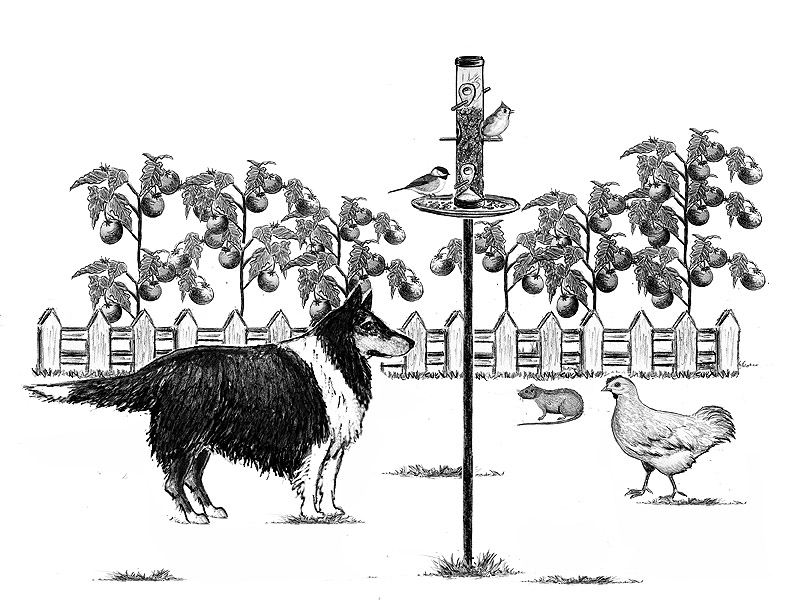
Dear Bird Folks,
A friend of mine said she may take down her birdfeeders because she is worried about attracting rats. I could never do that because I would miss my birds too much. Do you have any tips on feeding birds, while also avoiding rats?
– Nicky, Harwich Port, MA
You bet I do, Nicky,
Note: This is basically a reprint of a column I wrote on this topic a few years ago. I’ve reworked it a bit since some of the original writing doesn’t apply to this particular question. Other than that the information is basically the same. I suppose I could have written an entirely new column, but it’s spring and I’m kind of lazy. Don’t ask me what “spring” has to do with being lazy. It just sounds better.
The basic question is: Do rats eat birdseed? The answer is: Yes, of course they do, but they also come to a huge variety of other things we humans have to offer. Take gardens, for example. For years people have blamed squirrels and chipmunks for damaged fruits and vegetables, but I’d bet much of the time rats are the real culprits. Rats are nocturnal, so often their late night garden raids go unnoticed. And don’t forget those compost piles. Composting organic matter is a great idea, but rotting mounds of scraps are also appealing to a host of wild critters, including rats. Then there are the chickens. Raising chickens has become trendy in recent years, and why not? Hens provide us with fresh eggs, and as an added bonus, crowing roosters annoy the neighbors. Gotta love that. But along with fresh eggs comes buckets of grain, which are an open invitation for you-know-what. Finally, there is one other thing that may be the number one rat attractor of them all. Wanna know what it is? Okay, I’ll tell you, but you might not like it.
Rats enjoy birdseed, compost and chicken food, but something they also love comes from our old pal, the family dog. Yes, the dog, the one creature that just about everyone on Cape Cod considers sacred, may be the ultimate rat magnet. Why the dog? It’s no surprise that rats will come to spilled dog food, but one of their favorite menu items is (get ready) dog poop. Really. When I first read about this poop thing I did a double take. But then I discovered websites that supported this weird factoid. These websites include one posted by the State of Indiana, another by a Rhode Island newspaper and one particular website that really caught my eye: it’s called (and this is true), “Mr. Dog Poop.” At first I was skeptical about all this, but now I believe it – because Mr. Dog Poop has never steered me wrong.
What can be done to prevent rats from becoming a problem? I don’t want to speak on behalf of the Cape’s gardeners, chicken lovers and the ever-growing number of dog fanatics. But bird people should take a common sense approach to feeding birds. I sell birdseed, but I worry when some folks overdo it. My concern isn’t so much about attracting rats, but if the areas underneath feeders aren’t properly maintained, they may become unhealthy for the ground-feeding birds. You’ve heard me say this before, but people really should think twice about using the dreaded “mixed” birdseed. I don’t know who invented this awful stuff, but I’ll bet his name was “Willard” (remember that movie?). No matter what the package says, most ingredients in a mixture end up on the ground, where all kinds of furry creatures are waiting to feast on them.
If you are concerned about attracting rats, your number one goal should be to keep as much food off the ground as you possibly can. Attaching trays to your feeders will help catch any seeds that birds happen to drop (and they drop a lot). Folks should also consider using “hulled” sunflower seeds in their feeders. Hulled sunflower (aka, sunflower hearts) costs a bit more, but remember you also aren’t paying for the empty shells that will eventually land on the ground. Shells, whether they are empty or not, are an invitation to rodents. Also, keep in mind that like squirrels, chipmunks and raccoons, rats can climb just about anything, including metal poles. Adding squirrel baffles to your feeder poles will keep them off. Or you can simply bring your feeders (including suet feeders) in at night, when rats are most active. Bringing your feeders in at night also prevents them from being stolen by the raccoons. Yes, the raccoons steal them, so stop blaming the squirrels.
In addition to looking for food, rats are on a constant search for fresh water. (Apparently, eating all that dog poop, makes them thirsty.) Birdbaths set on pedestals are probably rat-proof, but it’s important to eliminate other sources of water. Forgotten flowerpots, dog bowls and trays under potted plants are just what rats are looking for. Removing standing water will not only deter rats, but it will discourage breeding mosquitoes, which, I think we all agree, are the insect equivalent of rats.
You can continue to feed your birds, Nicky, just don’t be sloppy about it. If you keep your seed secure and off the ground, you should be fine. However, I’m not the guy to ask for suggestions about gardens, or chickens or help with a pooping dog. For assistance with that last one you’ll have to consult a different expert, such as Mr. Dog Poop. He’s very good. I was going to end this column by making a joke about inventing “dog diapers,” but it turns out they already exist. Really. (And they say bird people are nuts.)